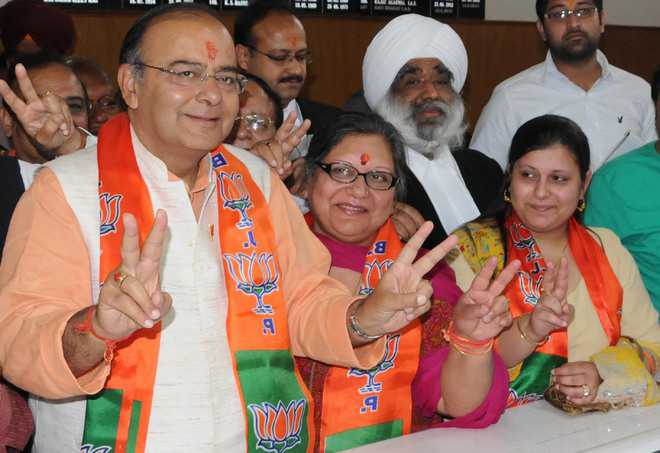
Arun Jaitley with his family members and BJP leaders at an election rally. File photo
Arun Joshi
Tribune News Service
Jammu, August 24
Arun Jaitley was a familiar face in Jammu and Kashmir, both in his personal and political life. He was married to Sangeeta, the eldest daughter of the longest-serving Finance Minister of the state Girdhari Lal Dogra, a leading light of the Congress and one of the confidants of late Prime Minister Indira Gandhi.
Jammuities would often call him with love “son-in-law” of Jammu. They were impressed by his love for the land.
That a national leader of unparalleled stature and a genius had Dogra wife was sufficient for them to feel proud of him. The best thing was that he always kept their trust.
From his love for food of “Paras Ram’s Dhaba” in Panjtirthi, a walled city locality, famous for Kashmiri cuisine, to his clear-eyed vision as to how the state would progress, are coming back as a flashback to those who knew him well.
Ashok Khajuria, MLC, who had worked closely with him since his ABVP days in 1970s, recalled his days in jail with him for 18 months during the Emergency, said “nothing had changed in him when he became minister and became active in J&K affairs”.
It was due to his capability to work with one and all that he was chosen to negotiate with the Farooq Abdullah government that was insistent on having discussions on the autonomy report, and Vajpayee wanted to give a face-saver to Abdullah who was facing a tough time in Kashmir. But those things didn’t go very far, as the Abdullah government lost the election in 2002.
Arun, however, continued to maintain his relationship at personal level with the Abdullah family. Farooq and he would often exchange notes on the Kashmir situation. He also discovered a “bright minister” in Omar Abdullah who was a junior minister with him in the Vajpayee government.
Much before he wrote an iconoclastic blog on the futility of the special status of Jammu and Kashmir in March this year in which he called the mainstream pleading for the retention of the special status to be treading the path of separatism, he had shared his understanding of the issue in an interactive session with civil society in Srinagar in December 2014. He had asked “Did special status of the state save it from the September 2014 floods that devastated Kashmir or did it rescue the marooned population that was desperately looking to be saved and urging for relief?”
His second poser left the audience answerless when he demanded to know the difference between the youth’s aspirations in Kashmir and elsewhere in the country, when all of them wanted to grow and excel. His thesis was rich in both scale and argument.
J&K, particularly Jammu and Ladakh, would remember him for having scripted the thesis of the abrogation of Article 370 and Article 35A, as a prescient politician who knew the pulse of the people, and also was keen as always that the youth from the Valley should walk in lockstep with their counterparts in the rest of the country. It was his this love that he gave an IIT, IIM and two AIIMS to Jammu and Kashmir in the budgets that he presented as Finance Minister in the first five years of the Modi government.
Arun Jaitley was able to convince J&K leadership, particularly the PDP president and then Chief Minister Mehbooba Mufti, about the benefits that the state would draw from the GST Council. The GST law passed by Parliament could not have been implemented in J&K because of Article 370 that prevented automatic application of the Central laws to the state.
It was his argumentative power and the support that he generated for the idea that the GST was extended to J&K. The bill was passed in a special session of the state legislature in the summer of 2017. He achieved what was considered to be unachievable in effectively bringing one tax system for the whole of nation, that later translated into what Prime Minister Narendra Modi called, “One nation, one constitution.”
During his tenure as Minister of State for Information and Broadcasting, he liberated Kashmiris of boredom, for he got the entertainment programmes introduced to “DD Kashmir”, a channel devoted to Kashmiri audience. Why programmes of other entertainment channels on DD Kashmir? He answered this with his trademark disarming smile “I want Kashmir to see quality programmes and then produce better quality programmes themselves.” His words proved prophetic.



























